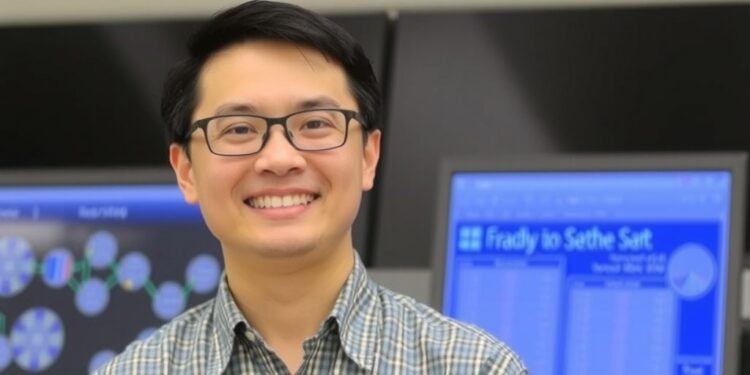
Weiwen Jiang, an Assistant Professor in the Electrical and Computer Engineering department at George Mason University’s College of Engineering and Computing, has been awarded significant funding from the National Science Foundation (NSF) for an exciting new project titled “CAREER: Efficient and Scalable Deployment Automation for Quantum-Centric Computing.” This research aims to advance the field of quantum computing through innovative solutions that streamline deployment processes. With a budget of $641,778, the project is set to commence in June 2025 and will run until late May 2030.
At the forefront of this research is the development of a comprehensive deployment automation framework known as AutoQC. This end-to-end pilot framework is designed for quantum-centric computing cyberinfrastructure, also referred to as QuCI. AutoQC will incorporate various essential components, such as resource allocation, system calibration and monitoring, as well as fault-tolerant circuit construction. Through these advancements, the project aims to enhance the scalability and efficiency of quantum computing resources, making them more accessible for a wide range of applications.
One of the key challenges in the field of quantum computing lies in managing resources effectively while ensuring that the systems are calibrated and monitored appropriately. The proposed deployment services will be focused on both near-term noisy intermediate-scale quantum (NISQ) devices and long-term fault-tolerant quantum computing (FTQC) systems. Jiang’s vision is to create a versatile framework that can seamlessly adapt to the varying requirements of these computing systems, thereby pushing the boundaries of what is possible in quantum technology.
Jiang has strategically divided his research into three critical areas, each targeting specific challenges associated with quantum computing. The first area focuses on just-in-time quantum performance characterization and resource allocation. This aspect seeks to dynamically assess the performance of quantum devices and allocate resources accordingly. By employing real-time performance metrics, this approach allows for optimal utilization of available quantum resources, thus enhancing the overall efficiency of the system.
The second area of the research addresses run-time efficient quantum device calibration with scalable monitoring. Proper calibration of quantum devices is crucial for ensuring accurate computations and minimizing errors. Jiang’s framework aims to develop calibration methods that can monitor devices during their operation, enabling automatic adjustments to maintain optimal performance levels without significant interruptions. This capability will not only improve the reliability of quantum computations but also reduce the time and effort involved in manual calibration processes.
The third area of Jiang’s research revolves around ahead-of-time learning-based logical gate construction for fault-tolerant quantum computing. Logical gates form the basic building blocks of quantum algorithms, and their efficient construction is vital for creating robust quantum circuits. By leveraging advanced machine learning techniques, this research will focus on predicting and optimizing the design of logical gates well before the actual implementation, thus paving the way for more successful quantum computations.
In an era where quantum computing has the potential to revolutionize various fields, from cryptography to complex system simulations, the significance of Jiang’s work cannot be overstated. Efficient deployment frameworks will not only enhance the performance of quantum systems but also facilitate collaborations among researchers, practitioners, and technology developers, creating a synergistic ecosystem that fosters innovation and discovery.
Furthermore, this research aligns with the national priority to advance quantum technologies, which have garnered substantial attention due to their transformative potential. As governments and industries invest heavily in quantum research and development, Jiang’s contributions are poised to play a pivotal role in shaping the future landscape of quantum computing.
As the project unfolds, the implications of Jiang’s work extend beyond the academic realm. The automated deployment framework will potentially benefit various industries that rely on quantum technologies, including pharmaceuticals, materials science, and artificial intelligence. The real-world applications of this research will likely lead to faster drug discovery processes, the development of new materials with unique properties, and improved algorithms for machine learning tasks.
Moreover, the initiative emphasizes education and the training of graduate students and early-career researchers. By involving students in groundbreaking research activities, Jiang aims to cultivate the next generation of talent in the field of quantum computing, ensuring that they are well-equipped to tackle future challenges and contribute meaningfully to technological advancements.
In summary, Weiwen Jiang’s work on the AutoQC framework signifies a meaningful step forward in the quest to harness the power of quantum computing. As he embarks on this five-year journey with NSF funding, the academic community eagerly anticipates the outcomes of his research. With efforts rooted in performance characterization, scalable calibration, and logical gate construction, Jiang’s project stands to redefine how quantum resources are deployed and utilized, which could ultimately lead to breakthroughs that are currently unimaginable in today’s computing landscape.
The innovation encapsulated in Jiang’s project reflects a broader movement within the scientific community to make quantum computing more tangible and applicable. As research in this domain progresses, collaborations between academia and industry will become increasingly crucial to translating theoretical advancements into practical solutions that address pressing global challenges.
By focusing on automation and efficiency, Jiang’s research aligns with the ongoing demand for more effective computational solutions in a world that is becoming ever more data-driven and reliant on sophisticated technologies. The promise of quantum computing is vast, and as practitioners like Jiang take on the mantle of leadership in this area, we can expect to see transformative developments in the toolkit available for scientists, engineers, and innovators around the globe.
Subject of Research: Efficient and Scalable Deployment Automation for Quantum-Centric Computing
Article Title: NSF Funds Groundbreaking Research for Quantum-Centric Computing Automation
News Publication Date: [To be determined]
Web References: [To be determined]
References: [To be determined]
Image Credits: [To be determined]
Keywords
Quantum computing, resource allocation, automation, system calibration, quantum devices, fault-tolerant computing, machine learning, research funding, NSF, QuCI.
Tags: deployment automation frameworkefficient resource allocation in quantum computingenhancing accessibility in quantum applicationsfault-tolerant circuit constructioninnovative solutions for quantum computingnear-term noisy intermediate-scale quantum computersNSF CAREER Award fundingproject budget for quantum researchquantum-centric computing researchQuCI cyberinfrastructure developmentscalable quantum computing solutionsWeiwen Jiang George Mason University





